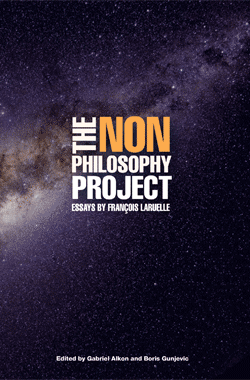Telos Press is pleased to announce the publication of The Non-Philosophy Project: Essays by François Laruelle, edited by Gabriel Alkon and Boris Gunjevic. Pre-order your copy in our store, and it will be shipped as soon as it is available.
 Are the things of this world given to thought? Are things really meant to be known, to be taken as the objective manifestations of a transcendental conditioning power? The Western philosophical tradition, according to François Laruelle, presupposes just this transcendental constitution of the real—a presupposition that exalts philosophy itself as the designated recipient of the transcendental gift. Philosophy knows what things really are because things—all things—are given to philosophy to be known. Laruelle’s trenchant essays show how this presupposition controls even the ostensibly radical critiques of the philosophical tradition that have proliferated in the postmodern aftermath of Nietzsche and Heidegger. For these critiques persist in assuming that the disruptive other is in some way given to their own discourse—which shows itself thereby to be still philosophical. An effective critique of philosophy must be non-philosophical. It must, according to Laruelle, suspend the presupposition that otherness is given to be known, that thought has a fundamentally differential structure. Non-philosophy begins not with difference, not with subject and object, but with the positing of the One. From this axiomatic starting point, non-philosophy takes as its material philosophy, rethought according to the One. The non-philosophy project does not, like so much postmodern philosophy, herald the end of philosophy. It takes philosophy as an occasion to raise the question of another kind of thought—one that, instead of differentially relating to the world that it presupposes, asserts that it is ultimately, in the flesh, at One with what it can never know.
Are the things of this world given to thought? Are things really meant to be known, to be taken as the objective manifestations of a transcendental conditioning power? The Western philosophical tradition, according to François Laruelle, presupposes just this transcendental constitution of the real—a presupposition that exalts philosophy itself as the designated recipient of the transcendental gift. Philosophy knows what things really are because things—all things—are given to philosophy to be known. Laruelle’s trenchant essays show how this presupposition controls even the ostensibly radical critiques of the philosophical tradition that have proliferated in the postmodern aftermath of Nietzsche and Heidegger. For these critiques persist in assuming that the disruptive other is in some way given to their own discourse—which shows itself thereby to be still philosophical. An effective critique of philosophy must be non-philosophical. It must, according to Laruelle, suspend the presupposition that otherness is given to be known, that thought has a fundamentally differential structure. Non-philosophy begins not with difference, not with subject and object, but with the positing of the One. From this axiomatic starting point, non-philosophy takes as its material philosophy, rethought according to the One. The non-philosophy project does not, like so much postmodern philosophy, herald the end of philosophy. It takes philosophy as an occasion to raise the question of another kind of thought—one that, instead of differentially relating to the world that it presupposes, asserts that it is ultimately, in the flesh, at One with what it can never know.
“Of the post-1960s generation of modern French thinkers, François Laruelle is the most difficult and arguably the most probing. He raises the question of whether there could not be a philosophy or philosophies entirely other to ‘philosophy’ as we know it, based upon different axiomatizations. The debate that must now ensue is whether or not some pre-modern, theological, and non-western philosophies were not indeed already ‘non-philosophies’ and whether a ‘non-philosophy’ must necessarily assume a materialist guise. Laruelle has moved the theoretical conversation well beyond post-structuralism and postmodernism. He is a great thinker, and we are all deeply in his debt.”
—John Milbank, Professor of Religion, Politics, and Ethics, University of Nottingham
“François Laruelle, uniquely, has probed the question of materialism to its very depths—to a point where monism challenges rationalism and the absoluteness of matter becomes a religious absolute, accessible only by gnosis. After his work, the world will forever look topsy-turvy. But maybe just this insight will help us to set it right in an altogether new and unexpected fashion.”
—Catherine Pickstock, Reader in Philosophy and Theology,Fellow and Tutor of Emmanuel College, Cambridge
“François Laruelle is not the ‘next big thing’ in philosophy. His thought does not aim to correct, reduce, or supersede that of Derrida, or Deleuze, or Badiou. That game of European ‘master thinkers’—with each new figure superseding the previous model—is over. What Laruelle offers us instead is a new vision of philosophy that is neither a right nor a wrong representation of reality, but is a material part of the real, a ‘mixte,’ ‘amphiboly,’ or ‘dyad’ that refracts the real. In The Non-Philosophy Project, we see Laruelle construct this vision in one of the most demanding and provocative intellectual practices within contemporary theory: an absolutely immanent, democratic, and materialist mode of thinking.”
—John Mullarkey, Professor of Film and Television Studies, Kingston University, London



